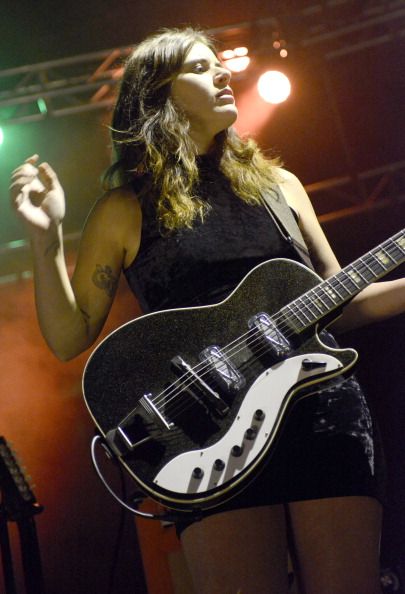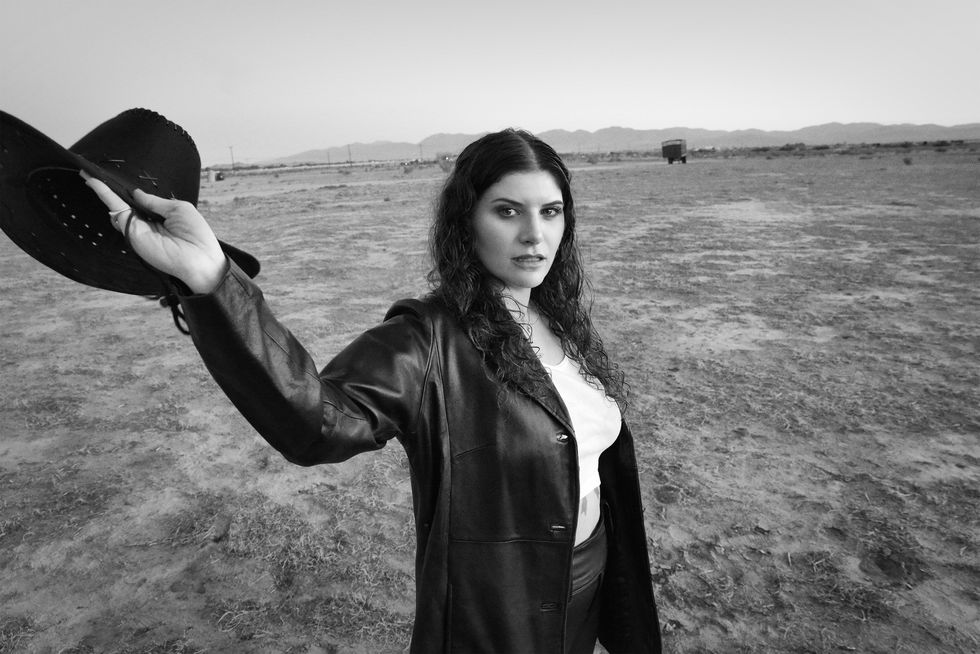With Best Coast on Hiatus, Bethany Cosentino Is Trying Something New
Bethany Cosentino was having an identity crisis. It was early 2020 and the pandemic had abruptly forced Cosentino’s band, Best Coast, to cut short a tour in support of their latest album, Always Tomorrow. Forced to promote the record while stuck at home, Cosentino became unable to ignore the creeping sense that something in her life was off. She briefly considered quitting music entirely, enrolling in a psychology course with the intention of becoming a therapist. “I very quickly realized that there’s a reason why I dropped out of college twice,” Cosentino, 36, quips over a video call from her Los Angeles abode.
During those uncertain early months of the pandemic, Cosentino and her bat-eared rescue dog, Josie, found a routine in taking long hikes around the city. Their soundtrack was by the music of Cosentino’s youth, before she discovered punk: singer-songwriters like Bonnie Raitt and Linda Ronstadt as well as ’90s country pop artists including Sheryl Crow, the Chicks, and Faith Hill. Crow was an especially bright North Star—a promotional poster for her 1993 debut Tuesday Night Music Club occupies prominent real estate on the wall of Cosentino’s home office. Without a real destination in mind, Cosentino began writing songs inspired by these women, an exercise which would become her solo debut, Natural Disaster.
In retrospect, Cosentino came to understand the discomfort that led her to the psychology class as the intuitive recognition that she was chafing against the confines of Best Coast, the project that had defined her life since she was 22. “I’m a big spiritual bitch and I saw it as a sign from the universe that I needed to explore a different side of myself,” she says. Which is not to suggest that she hadn’t attempted in the past. Across four albums, Best Coast’s sound evolved from lo-fi slacker anthems about all-consuming infatuation to hook-driven rock songs with lyrics that reflected Cosentino’s increasing self-reflection.
More From ELLE

But time and time again Cosentino felt dragged back towards a younger persona, which she describes as “a 22-year-old who liked weed and cats and boys and California.” This version of herself is preserved in amber on Best Coast’s stoned and sunny 2010 debut, Crazy for You. She had formed Best Coast just one year earlier, after dropping out of college in New York and moving home to L.A. to make music.
Driven by online buzz, the record was a critical and commercial success and peaked at no. 36 on the Billboard 200, a rare feat for indie musicians. But the acclaim was double-edged—Cosentino’s public visibility and persona made her a target of sexist online criticism. Cosentino doesn’t need to be reminded of what was written—she read all the comments. “I knew that I was rhyming ‘crazy,’ ‘lazy,’ and ‘baby’ over and over again,” she says with exasperation in reference to those who interpreted Best Coast’s jangly melodies as amateurish rather than intentional nods to ’60s surf rock bands like The Beach Boys.
A more complicated criticism was that the romantic relationship at the heart of Crazy for You glorified a retrograde version of feminism defined by codependency and emotional withholding. Cosentino admits that at the time, she didn’t give much thought to the critiques. “My way of arguing back then was just to be like ‘fuck you.’ “I wasn’t much of a critical thinker, I was mostly stoned and on Twitter,” she says. “But I definitely didn’t deserve to be called some of those things simply because I sang a song about how I loved a boy.”
Cosentino now has enough remove from that time of her life to be able to grapple with a more nuanced reality. A breakthrough moment arrived in 2022, when Best Coast celebrated 10th anniversaries of Crazy for You (albeit delayed by Covid) and 2012’s The Only Place with a pair of concerts in Los Angeles. “Relearning those records was the first time that I had really sat with the music and listened to my younger self. I didn’t know that I was in so much pain,” she says. “I wanted to emulate a sound and pay tribute to female artists who were writing about tortured love, like Lesley Gore and the Supremes, but I was also capturing my lived experience. None of that album is romantic.”
“Songwriting has always been the way in which I navigate having big feelings in the world and writing for Best Coast felt like a survival tactic,” she continues. “I now feel like I can choose what I write about, and how, because I have the tools to process things internally, I have a very good therapist, and I have healthy relationships and boundaries, all things that I didn’t have back then.”
Cosentino said that building this stable bedrock for herself has encouraged her to open up to new experiences, including ones she had closed herself off from in the past. Natural Disaster was produced by Butch Walker, whom Cosentino first met in her mid-20s when she was trying to pick a producer for Best Coast’s third album, California Nights. “I was very stubborn and I didn’t want someone to come in and reshape my songs,” Cosentino says. “Fast forward 10 years, and I now feel very inclined to allow multiple new people into this process. What do I have to lose?”
At Walker’s Nashville studio, the pair bonded over their abundance of tattoos—Cosentino’s include the phrase “peaceful easy feeling” inked on her arm—as well as a shared love of Fall Out Boy and Lucinda Williams. Their Southern locale seeped into the album’s sound, resulting in a blend of rock and country pop that, delightfully, places Cosentino’s voice in the spotlight. “At the start of Best Coast, I felt like the music I was making meant that I was supposed to be a subpar singer and that we needed to drench my vocals in reverb,” she explains. Her singing prowess became more prominent with each successive record and for Natural Disaster she wanted to go “balls to the wall” vocally.
This content is imported from youTube. You may be able to find the same content in another format, or you may be able to find more information, at their web site.
She channeled her childhood opera training on the gigantic mid-album highlight “For a Moment.” Written after the sudden death of an acquaintance’s partner, the song captures Natural Disaster’s central question: If nothing is guaranteed, what’s the point of anything? Across 12 tracks, Natural Disaster explores that line of thinking across uncertainties both global and personal. The title track confronts the climate crisis and the temptation to submit to apathy—references to extreme heat abound across the record. “Outta Time,” a modern response to Bonnie Raitt’s “Nick of Time,” explores the societal expectations placed upon women. Similarly, the soulful “Easy” explores the confusion that colors Cosentino’s desire for motherhood. Poignantly, Cosentino never forces concrete answers from these subjects. “While making this record I realized that I’ve spent the majority of my life living in black and white,” she says. Moving forward, she wants to embrace a “gray mindset” where despair and hope can intermingle like the gooey blobs inside of a lava lamp.
Natural Disaster never sugarcoats the reality that it’s hard to trust that everything’s going to be okay, even during the happiest parts of life. On the album’s final track, the barebones piano ballad “I’ve Got News for You,” Cosentino—who got engaged in June—writes about the fear that her vulnerability will only end in heartache and wonders if her partner feels the same way. As the song builds to a gut-wrenching insight—“I have worked so hard to find myself / I don’t wanna give up on it now”—it becomes clear that the only way to honor this growth is to dive into the unknown. But it never gets easier to trust that the landing will stick. “I would be the first person to tell you that not I’m not a risk taker, I’m the girl that goes to the same four restaurants over and over,” Cosentino says. But stepping out of her comfort zone over the past three years has helped her recognize that she’s taken some big risks throughout her life. In a way, it’s a full-circle moment: “I didn’t come back to L.A. expecting for Best Coast to become my career,” Cosentino says. “But I also believed in myself enough to take the leap.”
Quinn Moreland is a Brooklyn-based writer. Her work has appeared in Pitchfork, The New York Times, The Nation, and more.



